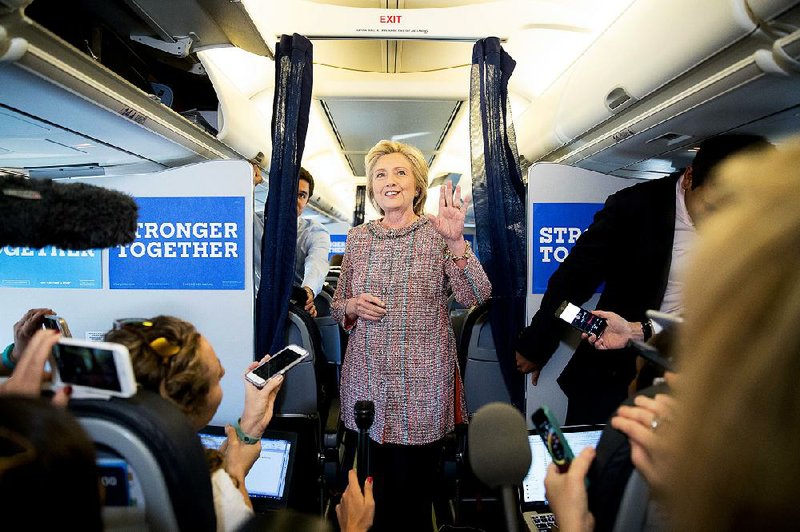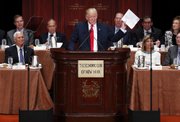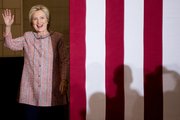GREENSBORO, N.C. -- Back on the campaign trail, Democrat Hillary Clinton said Thursday that her three-day, doctor-mandated break gave her new perspective on why she's running to be president. She vowed to push her campaign by giving Americans "something to vote for, not just against."
RELATED ARTICLES
http://www.arkansas…">N.H. paper breaks streak over Trump http://www.arkansas…">Jimmy Carter finds presidential race on the dismaying side
FULL ELECTION COVERAGE
Republican Donald Trump, meanwhile, released a new letter from his doctor Thursday detailing his blood pressure, cholesterol and medications, one day after Clinton made public a letter from her physician with similar information. Both candidates' doctors declared them fit to serve as president.
At the Economic Club of New York, Trump introduced a revised economic plan that calls for $4.4 trillion in tax cuts over 10 years, down from the $10 trillion, 10-year goal touted earlier in his campaign.
In North Carolina, Clinton made no apologies for keeping her pneumonia diagnosis from the public until a video emerged showing her stumbling and being supported by aides. She also repeatedly sidestepped questions about when her running mate Tim Kaine was informed.
An upbeat Clinton walked onstage at a rally in North Carolina to James Brown's song "I Got You (I Feel Good)." She said that while sitting at home this week was "pretty much the last place I wanted to be," the time helped clarify how she wants to close her campaign against Trump.
"We're offering ideas, not insults," she said in a jab at her Republican rival. "A plan that will make a real difference in people's lives, not prejudice and paranoia."
Clinton slammed North Carolina Gov. Pat McCrory, a Republican, for signing a law to prevent transgender people from using restrooms in schools and state government buildings that do not correspond to the gender on their birth certificates. The decision has angered businesses in the state, and this week the NCAA announced it was pulling seven sports championships from North Carolina.
"This is where bigotry leads, and we can't afford it, not here or anywhere else," Clinton said.
At an evening gala in Washington, Clinton accused Trump of fostering bigotry by refusing to acknowledge President Barack Obama was born in the United States, and urged Hispanic leaders to stoke a large voter turnout in November's election.
Trump, who helped fuel the rise of the so-called birther movement, told The Washington Post in an interview that he would "answer that question at the right time. I just don't want to answer it yet."
"He was asked one more time where was President Obama born, and he still wouldn't say Hawaii. He still wouldn't say America," Clinton said, taking the stage shortly after Obama at a gala of the Congressional Hispanic Caucus Institute. "This man wants to be our next president? When will he stop this ugliness, this bigotry?"
The Trump campaign released a statement late Thursday saying Trump "believes that President Obama was born in the United States." It also accused Clinton of launching the birther movement during her unsuccessful primary run against Obama in 2008.
The Thursday events marked Clinton's first public appearances since Sunday, when she abruptly left a Sept. 11, 2011, memorial service after getting dizzy and dehydrated. She had been diagnosed with pneumonia late last week, but the campaign informed the public only after the video of an ill Clinton emerged.
The incident prompted fresh questions about both candidates' openness regarding their health.
Their blood pressure
Trump's medical letter said the Republican is 6-foot-3 and 236 pounds -- giving him a body mass index falling into the "overweight" range.
The 70-year-old has blood pressure of 116 over 70, and his total cholesterol is 169, his doctor says. Trump takes a low dose of aspirin and a statin, rosuvastatin, also known as Crestor, which lowers cholesterol.
The letter said that Trump was examined on Sept. 9 by his doctor, Harold Bornstein, who wrote that the candidate was examined annually every spring.
Bornstein declared Trump in "excellent physical health" and noted that his parents, Mary and Fred, lived into their 80s and 90s. The doctor did not note that the elder Trump had Alzheimer's disease.
Clinton, 68, has blood pressure of 100 over 70, and her total cholesterol is 189, according to her doctor. Her letter made no mention of her weight, nor did a similar letter released last year.
Trump's team took a swipe at Clinton's brief absence from the campaign trail in a statement accompanying the new health information.
"We are pleased to disclose all of the test results which show that Mr. Trump is in excellent health, and has the stamina to endure -- uninterrupted -- the rigors of a punishing and unprecedented presidential campaign and, more importantly, the singularly demanding job of president of the United States," the campaign said.
Until Thursday, the only information on Trump's health had come in a letter from his doctor declaring he would be the healthiest person to ever serve as president. Before releasing the new details to the public, Trump turned over a copy to Dr. Mehmet Oz while taping an episode of Oz's TV show.
Clinton mocked Trump's televised disclosure of his health records, saying, "I'll never be the showman that my opponent is -- just look at the show he put on for Dr. Oz today."
On the show, Trump said that he has better stamina than anyone else and insisted that he has not had a cold in years, only seasonal hay fever.
Oz asked why Trump had not released his glowing medical report publicly; Trump, who has questioned Clinton's health for months, said that he considered these issues "private" but then said that it was important to know that a president would be healthy.
There are no laws or rules governing how much candidates need to disclose about their health. At 70, Trump would be the oldest candidate ever elected to the White House if he wins in November. Clinton, 68, would be close behind.
Trump's economic plan
Trump, after releasing his health information, spent Thursday laying out plans to lower taxes by $4.4 trillion over a decade and cut regulations, including some of those currently intended to protect the food Americans eat and the air they breathe.
In a speech to the Economic Club of New York, Trump said that his plan -- a mix of tax cuts, regulation elimination and new spending -- also would create 25 million new jobs.
Trump and his advisers say that would lead to booming economic growth of as much as 4 percent a year, which would make up for most of that lost tax revenue along with an infusion of new money from trade, energy and regulatory reforms.
The rest would come from almost $1 trillion in spending cuts made over the next decade, which Trump would accomplish by cutting one penny from every dollar from certain segments of the government each year.
"My plan will embrace the truth that people flourish under a minimum government burden and will tap into the incredible, unrealized potential of our workers and their dreams," Trump said.
For Trump's plans to succeed, they would have to overcome forces in the economy, such as rising automation, an aging population and low-wage competition overseas, that have led even conservative economists to call 4 percent growth an improbable goal.
The U.S. economy is already creating 2.5 million jobs a year, the same pace promised by Trump over the next decade.
"Trump took the budgetary criticism seriously and made a case that it actually adds up," said Douglas Holtz-Eakin, who was John McCain's economic policy director in the 2008 campaign and now is president of the American Action Forum.
Holtz-Eakin said Trump's economic plans are now roughly equivalent to those of Clinton, at least in scope, namely by proposing several ambitious initiatives and making a plausible, though not necessarily conclusive, argument on how to pay for them.
Trump also vowed Thursday to not cut defense spending and to exempt Social Security, Medicare, and Medicaid from any reductions. Those programs make up two-thirds of the federal budget.
That plan would put Trump in direct conflict with House Speaker Paul Ryan, R-Wis., whose plans for the federal budget, widely embraced by Republicans, call for reining in the costs of programs such as Medicare and Social Security.
The heart of Trump's plan is a revised tax code, which includes a pledge that no business should pay more than 15 percent of its income in taxes, down from the current 35 percent corporate tax rate. Few businesses now pay the full 35 percent rate, taking advantage instead of many deductions in the existing tax code.
He also proposed simplifying the U.S. tax code for individuals, reducing the current seven tax brackets to three: 12 percent, 25 percent and 33 percent of income after deductions.
Clinton and high court
In hinting at her own policy, Clinton said in a radio interview Thursday that she wouldn't be bound by President Barack Obama's nomination of Merrick Garland to the Supreme Court, hinting that she would consider a bolder choice if she takes office in January with the seat still unfilled.
Clinton would "look broadly and widely for people who represent the diversity of our country" if she has the opportunity to make "any" Supreme Court nominations, she said in the interview that aired on the Tom Joyner Morning Show. Garland turns 64 in November, is white and is widely considered an ideological moderate.
The comments are Clinton's most specific yet on how she would handle the ongoing vacancy.
Clinton said she wouldn't ask Obama to withdraw Garland's nomination after Election Day, leaving open the possibility he could be confirmed in a congressional lame-duck session.
"I think we should stick with one president at a time," Clinton said. "I'm going to let this president serve out his term with distinction and make the decisions that he thinks are right for the country."
Clinton didn't specifically rule out the possibility of renominating Garland. Senate Republicans have refused to consider the Garland nomination during Obama's presidency, saying they won't even take it up during a lame-duck session.
White House spokesman Josh Earnest pointed to Clinton's past statements of support for Garland and her calls for the Senate to act. When Obama selected Garland, "she said the president made a good choice," Earnest told reporters Thursday.
As for what Clinton might do if the nomination languishes until January, Earnest said: "If Senate Republicans are willing to do their job, it's not going to come to that."
In the radio interview, Clinton repeated past criticism of the Republicans' strategy, calling it a "disgrace." The court vacancy, created by Justice Antonin Scalia's Feb. 13 death, is the longest since 1970.
Information for this article was contributed by Julie Pace, Lisa Lerer, Jon Lemire, Jill Colvin, Nicholas Riccardi and Ken Thomas of The Associated Press; by Maggie Haberman of The New York Times; and by Mike Dorning, Greg Stohr and Sahil Kapur of Bloomberg News.
A Section on 09/16/2016


